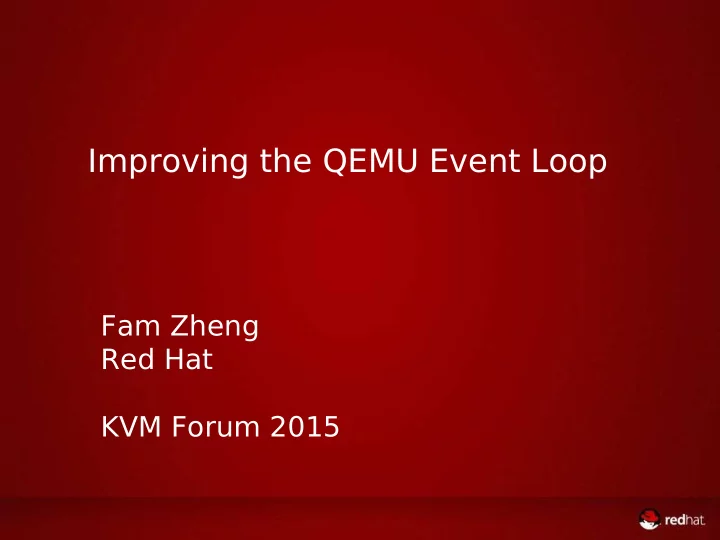

Improving the QEMU Event Loop Fam Zheng Red Hat KVM Forum 2015
Agenda • The event loops in QEMU • Challenges – Consistency – Scalability – Correctness
The event loops in QEMU
QEMU from a mile away
Main loop from 10 meters • The "original" iothread • Dispatches fd events – aio : block I/O, ioeventfd – iohandler : net, nbd, audio, ui, vfio, ... – slirp : -net user – chardev : -chardev XXX • Non-fd services – timers – bottom halves
Main loop in front • Prepare slirp_pollfds_fill(gpollfd, &timeout) qemu_iohandler_fill(gpollfd) timeout = qemu_soonest_timeout(timeout, timer_deadline) glib_pollfds_fill(gpollfd, &timeout) • Poll qemu_poll_ns(gpollfd, timeout) • Dispatch – fd, BH, aio timers glib_pollfds_poll() qemu_iohandler_poll() slirp_pollfds_poll() – main loop timers qemu_clock_run_all_timers()
Main loop under the surface - iohandler • Fill phase – Append fds in io_handlers to gpollfd • those registered with qemu_set_fd_handler() • Dispatch phase – Call fd_read callback if (revents & G_IO_IN) – Call fd_write callback if (revents & G_IO_OUT)
Main loop under the surface - slirp • Fill phase – For each slirp instance ("-netdev user"), append its socket fds if: • TCP accepting, connecting or connected • UDP connected • ICMP connected – Calculate timeout for connections • Dispatch phase – Check timeouts of each socket connection – Process fd events (incoming packets) – Send outbound packets
Main loop under the surface - glib • Fill phase – g_main_context_prepare – g_main_context_query • Dispatch phase – g_main_context_check – g_main_context_dispatch
GSource - chardev • IOWatchPoll – Prepare • g_io_create_watch or g_source_destroy • return FALSE – Check • FALSE – Dispatch • abort() • IOWatchPoll.src – Dispatch • iwp->fd_read()
GSource - aio context • Prepare – compute timeout for aio timers • Dispatch – BH – fd events – timers
iothread (dataplane) Equals to aio context in the main loop GSource... except that "prepare, poll, check, dispatch" are all wrapped in aio_poll(). while (!iothread->stopping) { while (!iothread->stopping) { aio_poll(iothread->ctx, true) ; aio_poll(iothread->ctx, true) ; } }
Nested event loop • Block layer synchronous calls are implemented with nested aio_poll(). E.g.: void bdrv_aio_cancel(BlockAIOCB *acb) void bdrv_aio_cancel(BlockAIOCB *acb) { { qemu_aio_ref(acb); qemu_aio_ref(acb); bdrv_aio_cancel_async(acb); bdrv_aio_cancel_async(acb); while (acb->refcnt > 1) { while (acb->refcnt > 1) { if (acb->aiocb_info->get_aio_context) { if (acb->aiocb_info->get_aio_context) { aio_poll(acb->aiocb_info->get_aio_context(acb), aio_poll(acb->aiocb_info->get_aio_context(acb), true); true); } else if (acb->bs) { } else if (acb->bs) { aio_poll(bdrv_get_aio_context(acb->bs), true); aio_poll(bdrv_get_aio_context(acb->bs), true); } else { } else { abort(); abort(); } } } } qemu_aio_unref(acb); qemu_aio_unref(acb); } }
A list of block layer sync functions • bdrv_drain • bdrv_drain_all • bdrv_read / bdrv_write • bdrv_pread / bdrv_pwrite • bdrv_get_block_status_above • bdrv_aio_cancel • bdrv_flush • bdrv_discard • bdrv_create • block_job_cancel_sync • block_job_complete_sync
Example of nested event loop (drive-backup call stack from gdb): #0 aio_poll #1 bdrv_create #2 bdrv_img_create #3 qmp_drive_backup #4 qmp_marshal_input_drive_backup #5 handle_qmp_command #6 json_message_process_token #7 json_lexer_feed_char #8 json_lexer_feed #9 json_message_parser_feed #10 monitor_qmp_read #11 qemu_chr_be_write #12 tcp_chr_read #13 g_main_context_dispatch #14 glib_pollfds_poll #15 os_host_main_loop_wait #16 main_loop_wait #17 main_loop #18 main
Challenge #1: consistency main loop dataplane iothread iohandler + slirp + interfaces aio chardev + aio g_main_context_query() enumerating fds add_pollfd() + ppoll() + ppoll() BQL + aio_context_acquire(s synchronization aio_context_acquire(other) elf) GSource support Yes No
Challenges
Challenge #1: consistency • Why bother? – The main loop is a hacky mixture of various stuff. – Reduce code duplication. (e.g. iohandler vs aio) – Better performance & scalability!
Challenge #2: scalability • The loop runs slower as more fds are polled – *_pollfds_fill() and add_pollfd() take longer. – qemu_poll_ns() (ppoll(2)) takes longer. – dispatch walking through more nodes takes longer.
O(n)
Benchmarking virtio-scsi on ramdisk
virtio-scsi-dataplane
Solution: epoll "epoll is a variant of poll(2) that can be used either as Edge or Level Triggered interface and scales well to large numbers of watched fds ." • epoll_create • epoll_ctl – EPOLL_CTL_ADD – EPOLL_CTL_MOD – EPOLL_CTL_DEL • epoll_wait • Doesn't fit in current main loop model :(
Solution: epoll • Cure: aio interface is similar to epoll! • Current aio implementation: – aio_set_fd_handler(ctx, fd, ...) aio_set_event_notifier(ctx, notifier, ...) Handlers are tracked by ctx->aio_handlers. – aio_poll(ctx) Iterate over ctx->aio_handlers to build pollfds[].
Solution: epoll • New implemenation: – aio_set_fd_handler(ctx, fd, ...) – aio_set_event_notifier(ctx, notifier, ...) Call epoll_ctl(2) to update epollfd. – aio_poll(ctx) Call epoll_wait(2). • RFC patches posted to qemu-devel list: http://lists.nongnu.org/archive/html/qemu-block/2015- 06/msg00882.html
Challenge #2½: epoll timeout • Timeout in epoll is in ms int ppoll(struct pollfd *fds, nfds_t nfds, const struct timespec *timeout_ts, const sigset_t *sigmask); int epoll_wait(int epfd, struct epoll_event *events, int maxevents, int timeout ); • But nanosecond granularity is required by the timer API!
Solution #2½: epoll timeout • Timeout precision is kept by combining timerfd: 1.Begin with a timerfd added to epollfd. 2.Update the timerfd before epoll_wait(). 3.Do epoll_wait with timeout=-1.
Solution: epoll • If AIO can use epoll, what about main loop? • Rebase main loop ingredients on to aio – I.e. Resolve challenge #1!
Solution: consistency • Rebase all other ingredients in main loop onto AIO: 1.Make iohandler interface consistent with aio interface by dropping fd_read_poll. [done] 2.Convert slirp to AIO. 3.Convert iohandler to AIO. [PATCH 0/9] slirp: iohandler: Rebase onto aio 4.Convert chardev GSource to aio or an equivilant interface. [TODO]
Unify with AIO
Next step: Convert main loop to use aio_poll()
Challenge #3: correctness • Nested aio_poll() may process events when it shouldn't E.g. do QMP transaction when guest is busy writing 1. drive-backup device=d0 bdrv_img_create("img1") -> aio_poll() 2. guest write to virtio-blk "d1": ioeventfd is readable 3. drive-backup device=d1 bdrv_img_create("img2") -> aio_poll() /* qmp transaction broken! */ ...
Solution: aio_client_disable/enable • Don't use nested aio_poll(), or... • Exclude ioeventfds in nested aio_poll(): aio_client_disable(ctx, DATAPLANE) op1->prepare(), op2->prepare(), ... op1->commit(), op2->commit(), ... aio_client_enable(ctx, DATAPLANE)
Thank you!
Recommend
More recommend